Business Law: Contractual Claims and Legal Principles
VerifiedAdded on 2021/04/21
|7
|1297
|29
Homework Assignment
AI Summary
This business law assignment analyzes four distinct scenarios to determine the existence and validity of contractual claims. The first scenario examines a claim of negligent misrepresentation against an agent of a company selling shock absorbers, referencing the cases of Hedley Byrne v Heller and Williams v Natural Life Health Foods. The second scenario assesses a claim related to promissory estoppel, where a promise regarding interest payments influences a party's actions, drawing upon the cases of Currie v Misa, Foakes v Beer, and Total Metal Manufacturing Ltd V. Tungsten Electric Co Ltd. The third scenario evaluates the formation of a contract based on an offer and its acceptance, referencing Carlill v Carbolic Smokeball Company and Hyde v Wrench. Finally, the fourth scenario deals with the issue of past consideration, referencing Thomas v Thomas and Re McArdle, to determine the validity of an agreement where a past action is used as consideration. Each scenario includes the identification of the legal issue, relevant legal rules, application of those rules to the facts, and a conclusion.
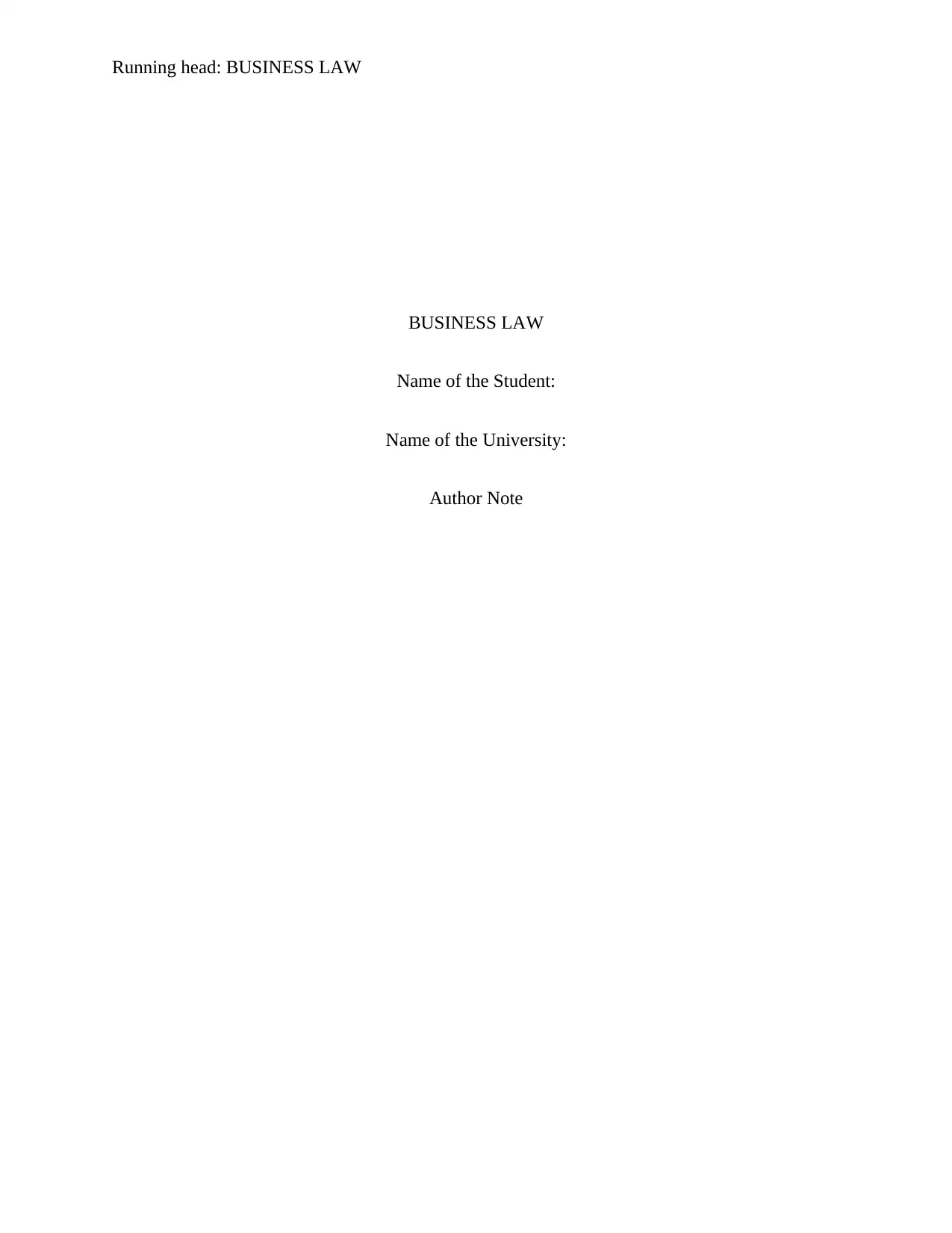
Running head: BUSINESS LAW
BUSINESS LAW
Name of the Student:
Name of the University:
Author Note
BUSINESS LAW
Name of the Student:
Name of the University:
Author Note
Paraphrase This Document
Need a fresh take? Get an instant paraphrase of this document with our AI Paraphraser
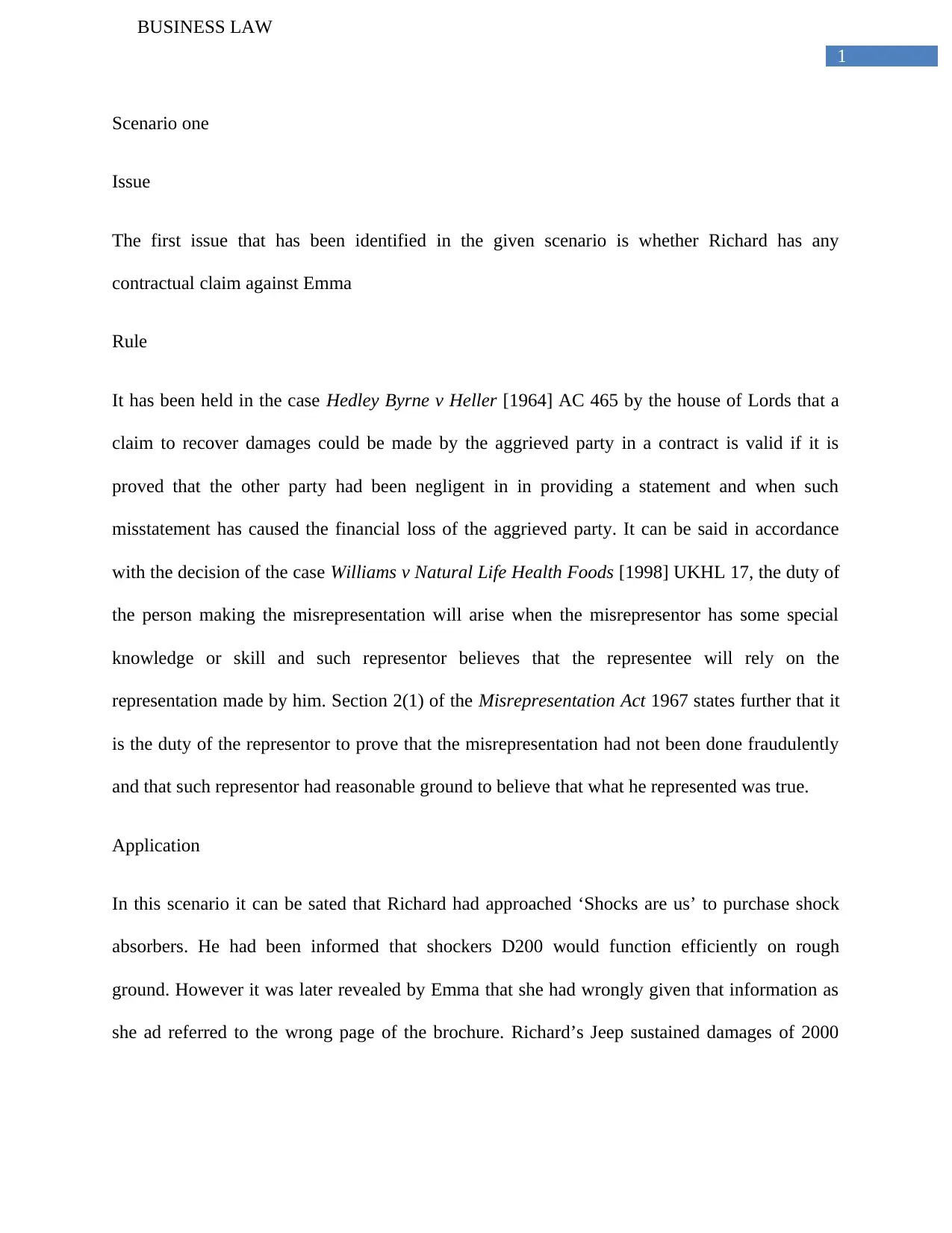
1
BUSINESS LAW
Scenario one
Issue
The first issue that has been identified in the given scenario is whether Richard has any
contractual claim against Emma
Rule
It has been held in the case Hedley Byrne v Heller [1964] AC 465 by the house of Lords that a
claim to recover damages could be made by the aggrieved party in a contract is valid if it is
proved that the other party had been negligent in in providing a statement and when such
misstatement has caused the financial loss of the aggrieved party. It can be said in accordance
with the decision of the case Williams v Natural Life Health Foods [1998] UKHL 17, the duty of
the person making the misrepresentation will arise when the misrepresentor has some special
knowledge or skill and such representor believes that the representee will rely on the
representation made by him. Section 2(1) of the Misrepresentation Act 1967 states further that it
is the duty of the representor to prove that the misrepresentation had not been done fraudulently
and that such representor had reasonable ground to believe that what he represented was true.
Application
In this scenario it can be sated that Richard had approached ‘Shocks are us’ to purchase shock
absorbers. He had been informed that shockers D200 would function efficiently on rough
ground. However it was later revealed by Emma that she had wrongly given that information as
she ad referred to the wrong page of the brochure. Richard’s Jeep sustained damages of 2000
BUSINESS LAW
Scenario one
Issue
The first issue that has been identified in the given scenario is whether Richard has any
contractual claim against Emma
Rule
It has been held in the case Hedley Byrne v Heller [1964] AC 465 by the house of Lords that a
claim to recover damages could be made by the aggrieved party in a contract is valid if it is
proved that the other party had been negligent in in providing a statement and when such
misstatement has caused the financial loss of the aggrieved party. It can be said in accordance
with the decision of the case Williams v Natural Life Health Foods [1998] UKHL 17, the duty of
the person making the misrepresentation will arise when the misrepresentor has some special
knowledge or skill and such representor believes that the representee will rely on the
representation made by him. Section 2(1) of the Misrepresentation Act 1967 states further that it
is the duty of the representor to prove that the misrepresentation had not been done fraudulently
and that such representor had reasonable ground to believe that what he represented was true.
Application
In this scenario it can be sated that Richard had approached ‘Shocks are us’ to purchase shock
absorbers. He had been informed that shockers D200 would function efficiently on rough
ground. However it was later revealed by Emma that she had wrongly given that information as
she ad referred to the wrong page of the brochure. Richard’s Jeep sustained damages of 2000
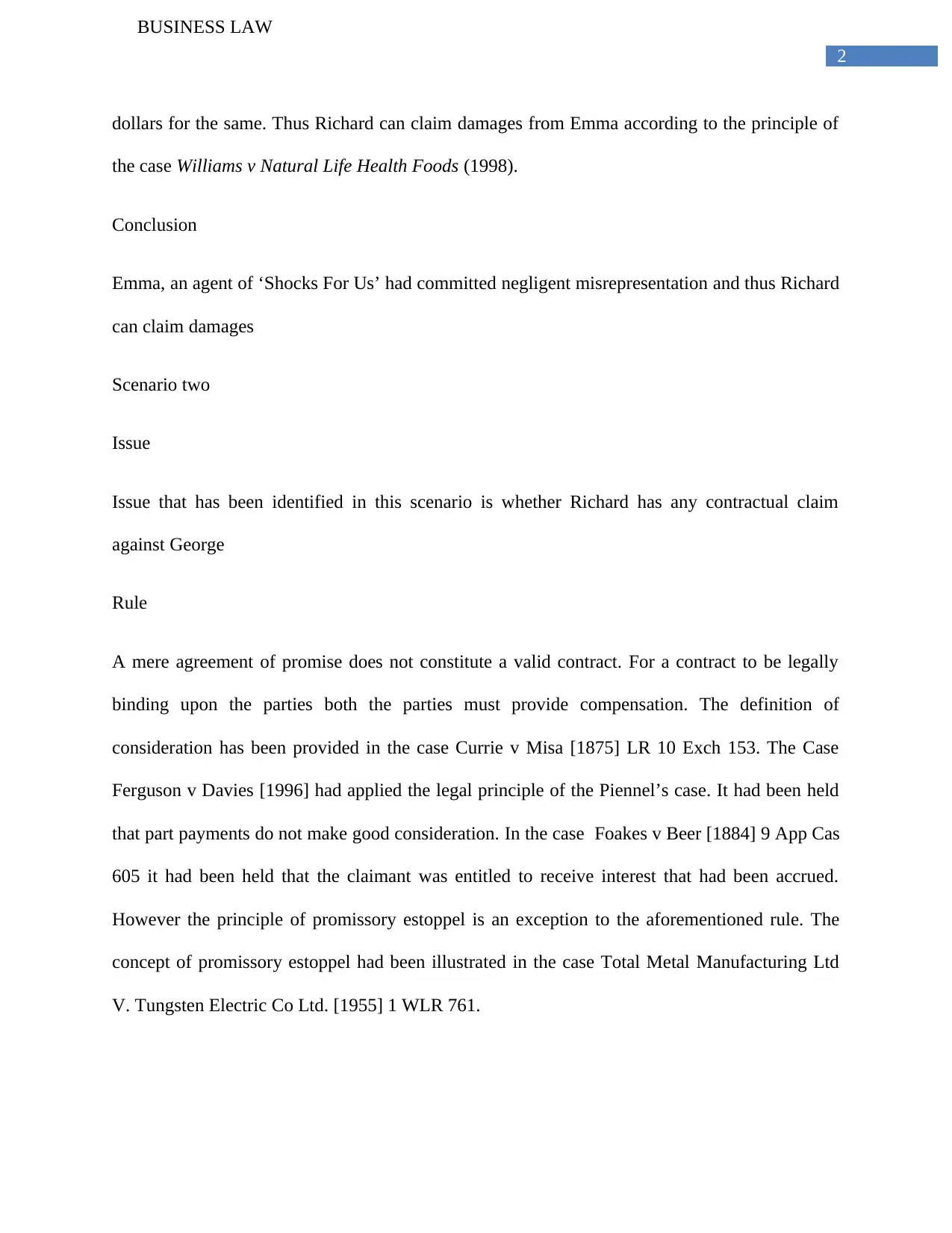
2
BUSINESS LAW
dollars for the same. Thus Richard can claim damages from Emma according to the principle of
the case Williams v Natural Life Health Foods (1998).
Conclusion
Emma, an agent of ‘Shocks For Us’ had committed negligent misrepresentation and thus Richard
can claim damages
Scenario two
Issue
Issue that has been identified in this scenario is whether Richard has any contractual claim
against George
Rule
A mere agreement of promise does not constitute a valid contract. For a contract to be legally
binding upon the parties both the parties must provide compensation. The definition of
consideration has been provided in the case Currie v Misa [1875] LR 10 Exch 153. The Case
Ferguson v Davies [1996] had applied the legal principle of the Piennel’s case. It had been held
that part payments do not make good consideration. In the case Foakes v Beer [1884] 9 App Cas
605 it had been held that the claimant was entitled to receive interest that had been accrued.
However the principle of promissory estoppel is an exception to the aforementioned rule. The
concept of promissory estoppel had been illustrated in the case Total Metal Manufacturing Ltd
V. Tungsten Electric Co Ltd. [1955] 1 WLR 761.
BUSINESS LAW
dollars for the same. Thus Richard can claim damages from Emma according to the principle of
the case Williams v Natural Life Health Foods (1998).
Conclusion
Emma, an agent of ‘Shocks For Us’ had committed negligent misrepresentation and thus Richard
can claim damages
Scenario two
Issue
Issue that has been identified in this scenario is whether Richard has any contractual claim
against George
Rule
A mere agreement of promise does not constitute a valid contract. For a contract to be legally
binding upon the parties both the parties must provide compensation. The definition of
consideration has been provided in the case Currie v Misa [1875] LR 10 Exch 153. The Case
Ferguson v Davies [1996] had applied the legal principle of the Piennel’s case. It had been held
that part payments do not make good consideration. In the case Foakes v Beer [1884] 9 App Cas
605 it had been held that the claimant was entitled to receive interest that had been accrued.
However the principle of promissory estoppel is an exception to the aforementioned rule. The
concept of promissory estoppel had been illustrated in the case Total Metal Manufacturing Ltd
V. Tungsten Electric Co Ltd. [1955] 1 WLR 761.
⊘ This is a preview!⊘
Do you want full access?
Subscribe today to unlock all pages.

Trusted by 1+ million students worldwide
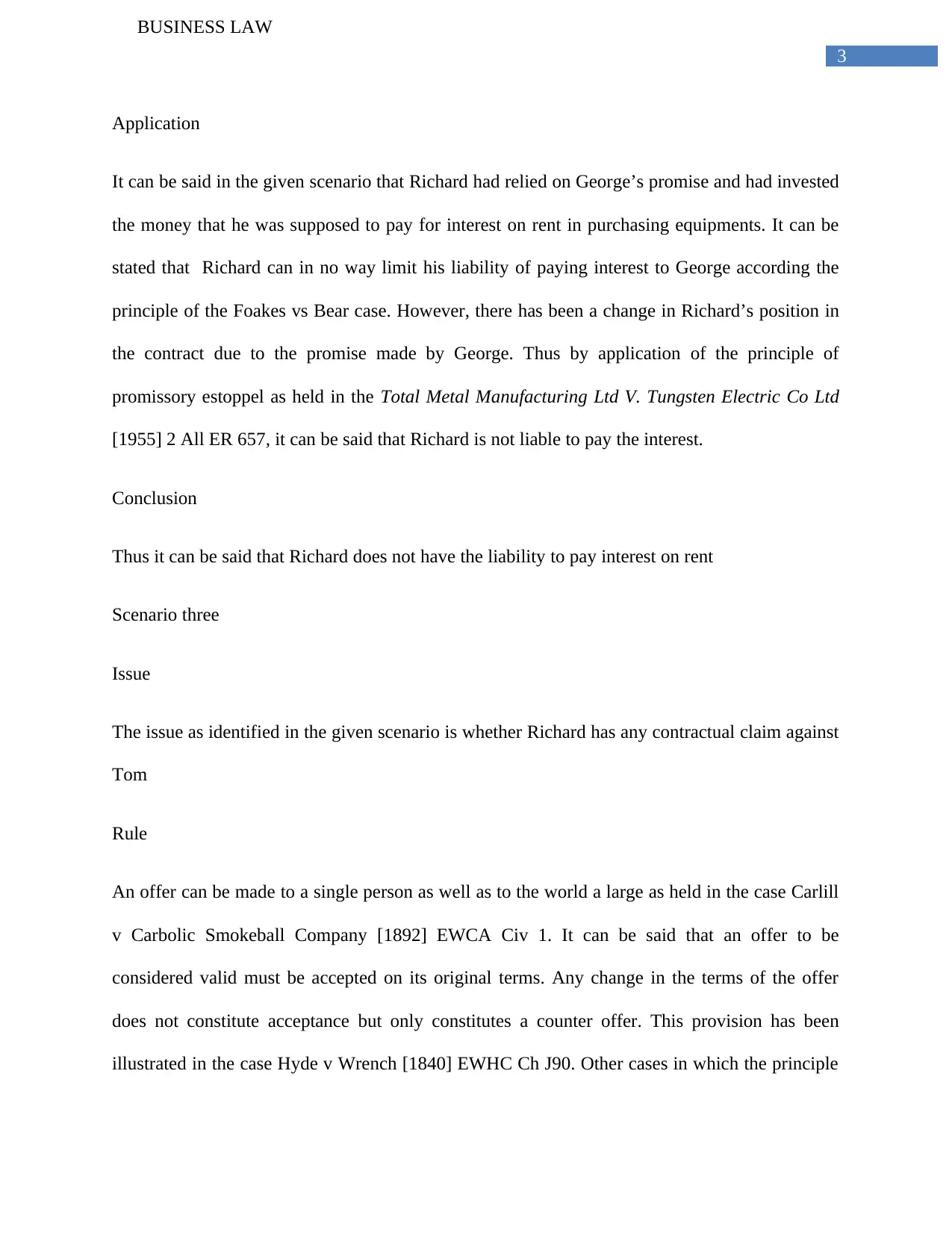
3
BUSINESS LAW
Application
It can be said in the given scenario that Richard had relied on George’s promise and had invested
the money that he was supposed to pay for interest on rent in purchasing equipments. It can be
stated that Richard can in no way limit his liability of paying interest to George according the
principle of the Foakes vs Bear case. However, there has been a change in Richard’s position in
the contract due to the promise made by George. Thus by application of the principle of
promissory estoppel as held in the Total Metal Manufacturing Ltd V. Tungsten Electric Co Ltd
[1955] 2 All ER 657, it can be said that Richard is not liable to pay the interest.
Conclusion
Thus it can be said that Richard does not have the liability to pay interest on rent
Scenario three
Issue
The issue as identified in the given scenario is whether Richard has any contractual claim against
Tom
Rule
An offer can be made to a single person as well as to the world a large as held in the case Carlill
v Carbolic Smokeball Company [1892] EWCA Civ 1. It can be said that an offer to be
considered valid must be accepted on its original terms. Any change in the terms of the offer
does not constitute acceptance but only constitutes a counter offer. This provision has been
illustrated in the case Hyde v Wrench [1840] EWHC Ch J90. Other cases in which the principle
BUSINESS LAW
Application
It can be said in the given scenario that Richard had relied on George’s promise and had invested
the money that he was supposed to pay for interest on rent in purchasing equipments. It can be
stated that Richard can in no way limit his liability of paying interest to George according the
principle of the Foakes vs Bear case. However, there has been a change in Richard’s position in
the contract due to the promise made by George. Thus by application of the principle of
promissory estoppel as held in the Total Metal Manufacturing Ltd V. Tungsten Electric Co Ltd
[1955] 2 All ER 657, it can be said that Richard is not liable to pay the interest.
Conclusion
Thus it can be said that Richard does not have the liability to pay interest on rent
Scenario three
Issue
The issue as identified in the given scenario is whether Richard has any contractual claim against
Tom
Rule
An offer can be made to a single person as well as to the world a large as held in the case Carlill
v Carbolic Smokeball Company [1892] EWCA Civ 1. It can be said that an offer to be
considered valid must be accepted on its original terms. Any change in the terms of the offer
does not constitute acceptance but only constitutes a counter offer. This provision has been
illustrated in the case Hyde v Wrench [1840] EWHC Ch J90. Other cases in which the principle
Paraphrase This Document
Need a fresh take? Get an instant paraphrase of this document with our AI Paraphraser
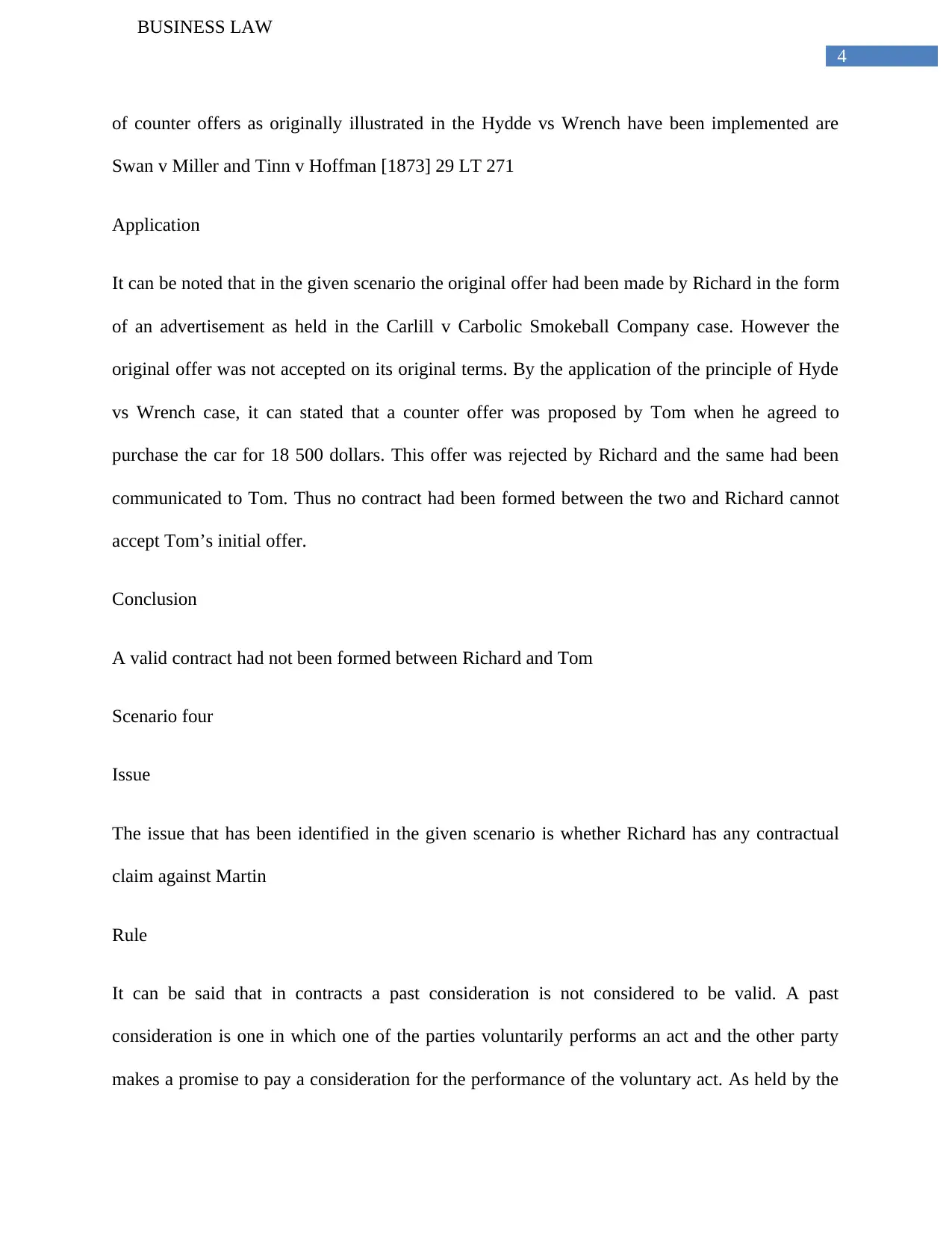
4
BUSINESS LAW
of counter offers as originally illustrated in the Hydde vs Wrench have been implemented are
Swan v Miller and Tinn v Hoffman [1873] 29 LT 271
Application
It can be noted that in the given scenario the original offer had been made by Richard in the form
of an advertisement as held in the Carlill v Carbolic Smokeball Company case. However the
original offer was not accepted on its original terms. By the application of the principle of Hyde
vs Wrench case, it can stated that a counter offer was proposed by Tom when he agreed to
purchase the car for 18 500 dollars. This offer was rejected by Richard and the same had been
communicated to Tom. Thus no contract had been formed between the two and Richard cannot
accept Tom’s initial offer.
Conclusion
A valid contract had not been formed between Richard and Tom
Scenario four
Issue
The issue that has been identified in the given scenario is whether Richard has any contractual
claim against Martin
Rule
It can be said that in contracts a past consideration is not considered to be valid. A past
consideration is one in which one of the parties voluntarily performs an act and the other party
makes a promise to pay a consideration for the performance of the voluntary act. As held by the
BUSINESS LAW
of counter offers as originally illustrated in the Hydde vs Wrench have been implemented are
Swan v Miller and Tinn v Hoffman [1873] 29 LT 271
Application
It can be noted that in the given scenario the original offer had been made by Richard in the form
of an advertisement as held in the Carlill v Carbolic Smokeball Company case. However the
original offer was not accepted on its original terms. By the application of the principle of Hyde
vs Wrench case, it can stated that a counter offer was proposed by Tom when he agreed to
purchase the car for 18 500 dollars. This offer was rejected by Richard and the same had been
communicated to Tom. Thus no contract had been formed between the two and Richard cannot
accept Tom’s initial offer.
Conclusion
A valid contract had not been formed between Richard and Tom
Scenario four
Issue
The issue that has been identified in the given scenario is whether Richard has any contractual
claim against Martin
Rule
It can be said that in contracts a past consideration is not considered to be valid. A past
consideration is one in which one of the parties voluntarily performs an act and the other party
makes a promise to pay a consideration for the performance of the voluntary act. As held by the
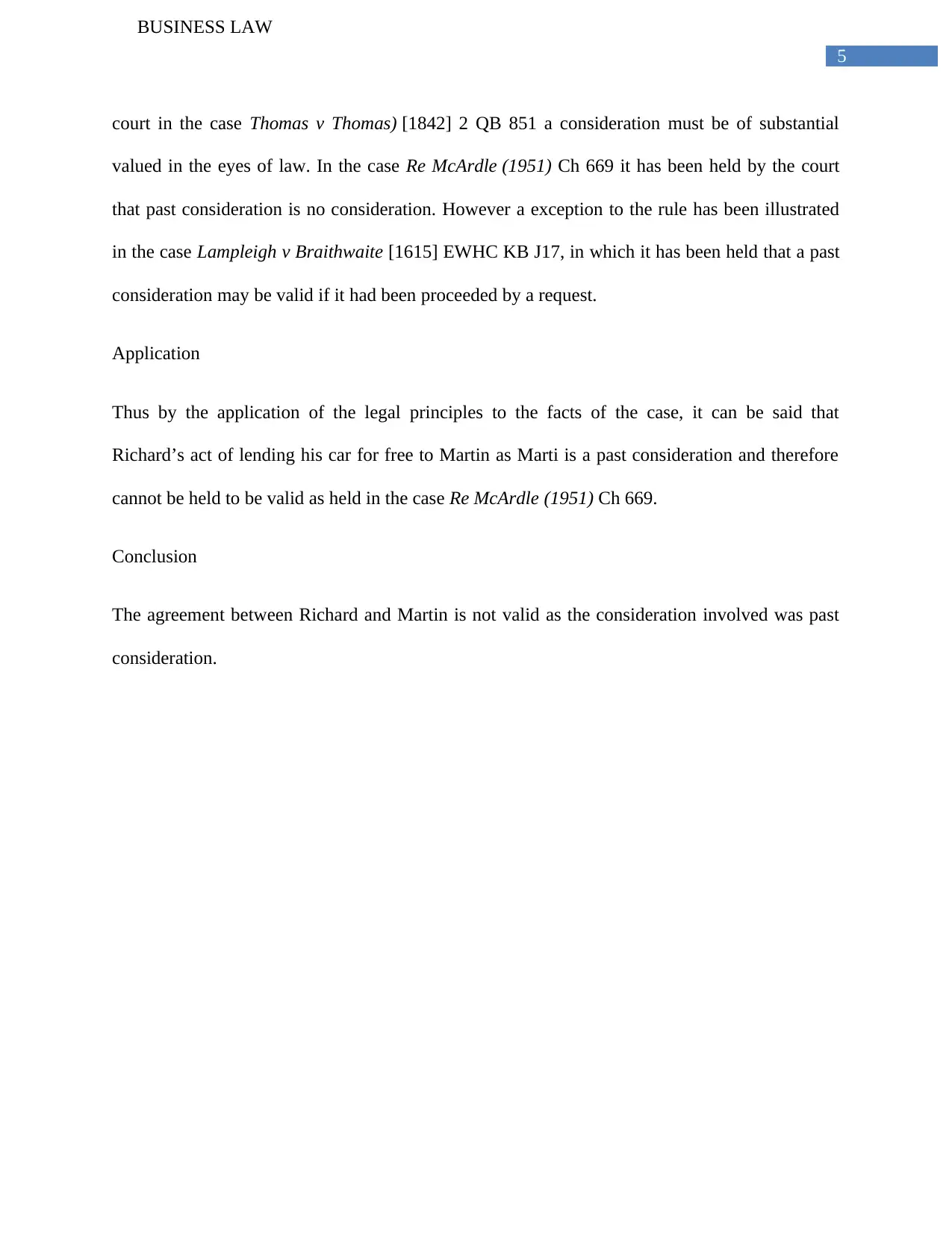
5
BUSINESS LAW
court in the case Thomas v Thomas) [1842] 2 QB 851 a consideration must be of substantial
valued in the eyes of law. In the case Re McArdle (1951) Ch 669 it has been held by the court
that past consideration is no consideration. However a exception to the rule has been illustrated
in the case Lampleigh v Braithwaite [1615] EWHC KB J17, in which it has been held that a past
consideration may be valid if it had been proceeded by a request.
Application
Thus by the application of the legal principles to the facts of the case, it can be said that
Richard’s act of lending his car for free to Martin as Marti is a past consideration and therefore
cannot be held to be valid as held in the case Re McArdle (1951) Ch 669.
Conclusion
The agreement between Richard and Martin is not valid as the consideration involved was past
consideration.
BUSINESS LAW
court in the case Thomas v Thomas) [1842] 2 QB 851 a consideration must be of substantial
valued in the eyes of law. In the case Re McArdle (1951) Ch 669 it has been held by the court
that past consideration is no consideration. However a exception to the rule has been illustrated
in the case Lampleigh v Braithwaite [1615] EWHC KB J17, in which it has been held that a past
consideration may be valid if it had been proceeded by a request.
Application
Thus by the application of the legal principles to the facts of the case, it can be said that
Richard’s act of lending his car for free to Martin as Marti is a past consideration and therefore
cannot be held to be valid as held in the case Re McArdle (1951) Ch 669.
Conclusion
The agreement between Richard and Martin is not valid as the consideration involved was past
consideration.
⊘ This is a preview!⊘
Do you want full access?
Subscribe today to unlock all pages.

Trusted by 1+ million students worldwide
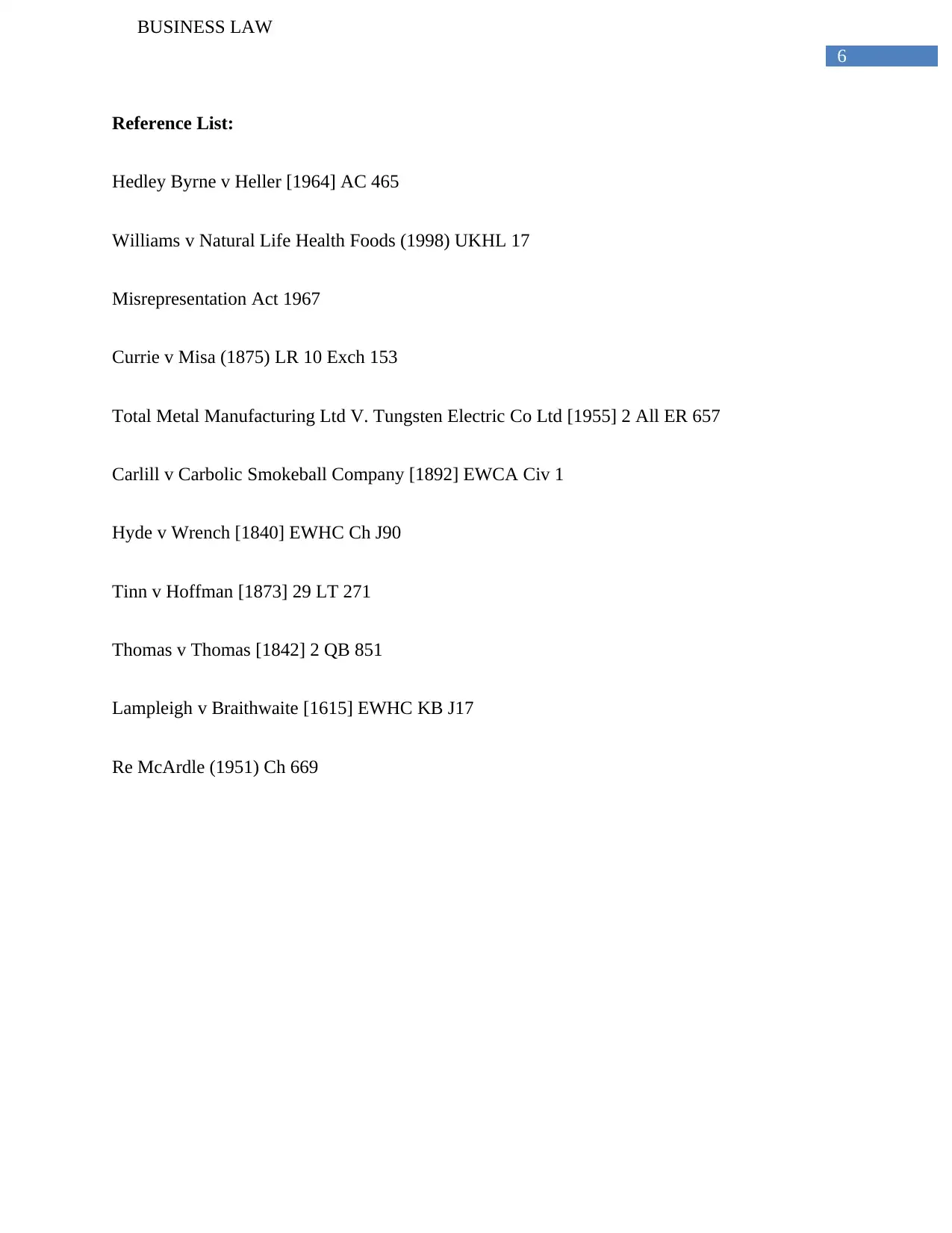
6
BUSINESS LAW
Reference List:
Hedley Byrne v Heller [1964] AC 465
Williams v Natural Life Health Foods (1998) UKHL 17
Misrepresentation Act 1967
Currie v Misa (1875) LR 10 Exch 153
Total Metal Manufacturing Ltd V. Tungsten Electric Co Ltd [1955] 2 All ER 657
Carlill v Carbolic Smokeball Company [1892] EWCA Civ 1
Hyde v Wrench [1840] EWHC Ch J90
Tinn v Hoffman [1873] 29 LT 271
Thomas v Thomas [1842] 2 QB 851
Lampleigh v Braithwaite [1615] EWHC KB J17
Re McArdle (1951) Ch 669
BUSINESS LAW
Reference List:
Hedley Byrne v Heller [1964] AC 465
Williams v Natural Life Health Foods (1998) UKHL 17
Misrepresentation Act 1967
Currie v Misa (1875) LR 10 Exch 153
Total Metal Manufacturing Ltd V. Tungsten Electric Co Ltd [1955] 2 All ER 657
Carlill v Carbolic Smokeball Company [1892] EWCA Civ 1
Hyde v Wrench [1840] EWHC Ch J90
Tinn v Hoffman [1873] 29 LT 271
Thomas v Thomas [1842] 2 QB 851
Lampleigh v Braithwaite [1615] EWHC KB J17
Re McArdle (1951) Ch 669
1 out of 7
Related Documents
Your All-in-One AI-Powered Toolkit for Academic Success.
+13062052269
info@desklib.com
Available 24*7 on WhatsApp / Email
![[object Object]](/_next/static/media/star-bottom.7253800d.svg)
Unlock your academic potential
Copyright © 2020–2026 A2Z Services. All Rights Reserved. Developed and managed by ZUCOL.





